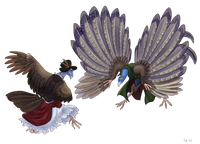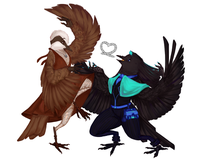- Created
- 1 year, 10 months ago
- Creator
- YeeshaStone
- Favorites
- 0
Profile
Like many of the Serpentes and Coleoptera species the Aves young come from eggs. However unlike the other species all Aves hatch from eggs whereas there are many exceptions to this rule in the other species.
Eggs
Soon after conception an Aves will lay an egg and where other bird creatures constantly have eggs that are not furtle, when an Aves lays an egg it will almost always be fertile. After she births the egg it must be kept warm and humid. Many parents will spend long hours laying with their eggs unclothed to keep them in the proper condition. Those that do so will often pluck feathers from their chest to create a more humid and warm environment for their egg. Doing so creates some of the best chances of its survival, but it also creates a temporary bald spot on their chest area known as a brood patch. If they don’t keep it under control it can even become permanently plucked. After a few months of tending to the egg, if all goes well it will hatch. This hatching process is often quick, only taking a few hours, however sometimes it can last for a day or two if the chick inside is particularly weak. Although not common, occasionally the parents will hold a ‘hatching party’ for their child and invite others over to watch their child emerge from the egg, celebrating its arrival into the world. Some do have issues with this practice as the parents of the child will often be distracted during the event causing the egg to get too cold and the child dying before it can escape.
The Aves species have some of the largest average family size, only beaten by the Coleoptera. This isn’t to say that every subspecies has big families, but a majority of them do. As the families grow one egg at a time, many of the older siblings will start to help in taking care of the younger chicks both in helping to raise them and taking turns keeping the egg warm.
Chicks
When a chick is first born it needs a lot of care and attention. Not only must it be kept warm at almost all times, but many Aves are unable to eat any kind of ‘normal’ food for a number of weeks. Instead the chicks will survive off of a special mixture that their parents make in their gullet. The parents will eat food and cause it to turn into a liquid paste (often referred to ask ‘milk’) that they will then regurgitate to their chicks. Although nearly all Aves find this action mundane or even cute to an extent, most other species think of it as horrifying as to them it appears as if their parents are throwing up into their children's open mouths. Because of the kind of negative stigma mouth feeding can get from other species, many Aves who need to feed their young in public will make the milk early that day and feed it to their children with a spoon when they are out and about.
Partners
When it comes to selecting a mate many subspecies have different ways of doing so. Some look for the most attractive, others for the strongest of their subspecies. Many subspecies have what are called ‘mating dances’ that interested couples will participate in. The soon to be couple will throw an extravagant party inviting anyone and everyone to join in the festivities. Many different activities may happen at these events, but the main focus of them will always be the pair and at the height of the party the two will participate in an elaborate dance together. The two of them have not practiced this dance beforehand, but rather feel eachother out during this dance to see if they can move in sync with one another. It is very common for the males of a subspecies to be more elaborate and wild when it comes to their dance moves and outfits where females tend to be a bit more reserved, preferring to accompany their dance partner rather than being the center of attention. Most of the time the two may have a few mess ups, but for the most part things will go smoothly, however occasionally it turns into a terrible disaster and the two will more likely part ways afterwards due to the belief that they are incompatible.

